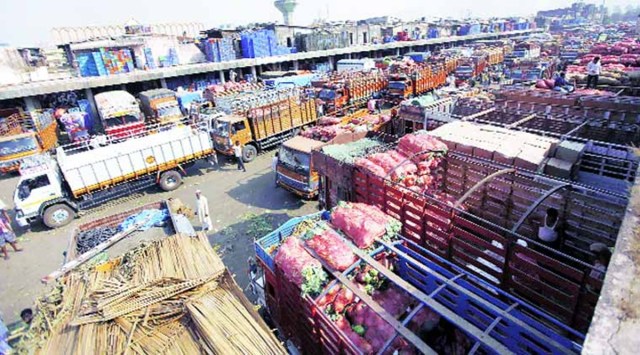- India
- International
Gujarat: Govt yet to notify amended APMC Act rules, traders operate with expired licences
The state government had promulgated an ordinance on May 6 amending the Gujarat Agricultural Produce Markets Act, 1963, popularly called the APMC Act.
 The ordinance stated that the licences issued to traders by APMCs will be deemed universal.(Representational)
The ordinance stated that the licences issued to traders by APMCs will be deemed universal.(Representational)WITH THE state government not having been able to notify rules of the new agricultural laws and the validity of licences issued by the agricultural produce market committees (APMCs) to traders having expired, the primary trade of agricultural commodities has been going on without any seeming control of any authority in the state for more than a month.
The state government had promulgated an ordinance on May 6 amending the Gujarat Agricultural Produce Markets Act, 1963, popularly called the APMC Act. In September, the Assembly cleared a Bill repealing the ordinance and amending the APMC Act as the Agricultural Produce Marketing (Promotion and Facilitation) Act, 1963.
The ordinance had ended the monopoly of APMCs over the primary trade or agricultural produce by limiting their jurisdiction to the physical boundaries of their yards as well as introducing universal licenses to traders with pan-state validity. Till May 5, APMCs were authorised to issue licences to traders as well as commission agents who wanted to operate in their respective jurisdiction which generally extended to the taluka in which their respective yards were located or, in some cases, neighbouring one or two talukas. These licences were valid in the jurisdiction of the APMC which had issued them.
The ordinance stated that the licences issued to traders by APMCs will be deemed universal. The ordinance was to remain in force till November 5, hence the deemed universal licences of traders were also valid till November 5.
The amended APMC Act empowered the director of agricultural marketing and rural finance (DAMRF) or officers authorised by him/her to issue universal licences to traders. However, apparently, no apparatus was in place to issue such licences till November 5.

A senior officer of Agriculture department said that the APMC Act is a subject of Cooperation department which has not issued the rules for the amended Act yet.
When contacted, Minister of State for Cooperation (Independent Charge) Ishwarsinh Patel conceded rules for the amended Act had not been notified till date but added: “We are in the process to frame the rules. It will be issued within one week. It (the draft rules) has been sent to the Legislative department and it will be issued within a week,” he said.
Patel attributed the delay in framing the rules for the amended Act to the nationwide lockdown owing to Covid-19 pandemic.
A senior officer from the Cooperation department also said, “The rules are ready and will be notified anytime most probably next week.”
About issuance of unified licence and the state’s control over a trader buying directly from a farmer, the officer said, “The unified licence is necessary only if the trader wants to trade at an APMC. It is not required if a trader wants to buy directly from the farmer.”
A similar law enacted by the Centre makes one holding a PAN card eligible to make direct procurement from farmers.
In Gujrat, however, in absence of rules of the law, the DAMRF, on November 11, had delegated powers to deputy directors of agricultural marketing and rural finance (DyDAMRF) in districts to issue “ad hoc licences” of trading so that primary trade of agricultural commodities is not disrupted.
But DyDAMRF in districts say that they have not been able to issue a single ad hoc licence till date. “We are getting dozens of phone calls and enquiries about the procedure to obtain a licence of trading. But for want of guidelines and clarity from our head office, we have not been able to issue any ad hoc licence till date. We are told rules of the amended law have not been framed nor is there any guideline about the amount of fee to be charged and modalities to collect it from the applicants,” a DyDAMRF in one of the districts of Saurashtra told The Indian Express. On the other hand, APMC administrations say their yards are functioning in a business-as-usual manner.
“While it is true there has not been any communication from the state government about the status of traders’ licences, traders are operating presuming validity of their licences has been extended and we are also allowing them to trade under the same assumption. Since the ordinance was promulgated, there has not been any decline in arrivals in our yard. This means the provision of the amended law allowing traders to procure directly from farmers without paying any marketing fee doesn’t seem to have any impact on our APMC,” Vishnu Patel, secretary of Unjha APMC in Mehsana district said.
Devraj Sakhiya, chairman of Rajkot APMC, said that trade outside the boundaries of the yard was left to “wisdom” of farmers. “As the government has not issued them (traders) licences yet, there is a question as to who oversees them. In such an environment, it is purely dependent on the wisdom of farmers whether to sell his produce at the gate of his farm or not,” the chairman said.
But traders say that they haven’t faced any difficulty as yet despite the lack of clarity about the law. “No one from the government or from any other authority has stopped us from procuring cotton from farmers. Nor are farmers apprehensive to sell to us. I am still considering the trading licence issued to me by Amreli APMC as valid,” Bhupat Metaliya, a trader who also runs cotton ginning factories in Amreli said.
“However, I stand to save substantial amount which otherwise I was paying to AMPC towards cess every year despite buying cotton directly from farmers,” Metliya further said.
Others said APMCs had no objection to they operating on their yards provided they paid the cess. “The commission agents through which we procure, raise bills inclusive of 0.5 per cent cess before sending them to us for settlement. As was the system earlier, the yard is allowing us to load produce procured from the yard only if the cess is paid,” Ramesh Lalcheta, a trader who also represents traders on the board of directors of Gondal APMC in Rajkot said.
Must Read
Apr 23: Latest News
- 01
- 02
- 03
- 04
- 05




































